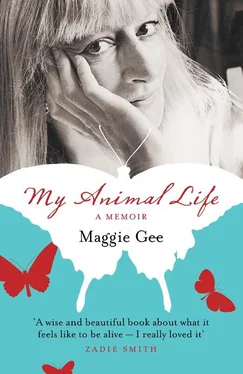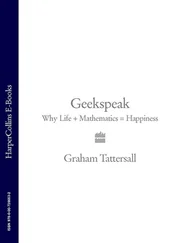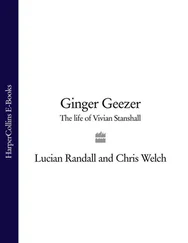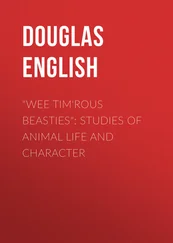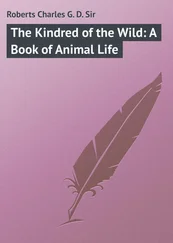They had been amused, thank God, by the fence, which could only mean one thing: they really liked him. My father was capable of turning that into a crime, but instead he had seen himself in Nick’s shoes; it was the act of a nervous, eager suitor. ‘Vic, I would like to marry your daughter.’ My father laughed soundlessly and tossed back his head in the way he did when he was happy, but he guarded himself against sentiment. ‘I expect you will whatever I say,’ he riposted, robustly, but he shook Nick’s hand. Nick would do for his unmarried daughter.
He did more than ‘do’. They both came to adore him. My mother loved his good looks and charm, and of course, the way he did not bully me. She did not worry that he was poor; she was right, he became a good, steady earner, though we Rankin-Gees have never been rich. They both loved his humour, especially the absurd characters he suddenly improvised from nowhere, a heritage from his ancestry — Sarah Siddons, the famous eighteenth-century actress, was his great-great-great-great-great-grandmother — which sent them into paroxysms of laughter. Later, when he became a BBC broadcaster, they listened loyally to his programmes, bent over the radio in the kitchen, though World Service reception was bad in Norfolk, and wrote him long appreciative letters.
‘I love young men,’ Mum said to me, in much the same words that I use now. ‘There’s something lovely about young men.’ He was there when she was dying, only nine years later, making her laugh in the hospital on the very last evening of her life with a joke that plays upon a less romantic side of tenderness across the generations. It has to be said with a strong Norfolk burr:
‘Arrr yew goin’ ter com up Weely Woods with me tonoight, gurl?’
‘No-ow! Moy mothuhr wooden’ loik it.’
‘Yowur mothuhr ain’ goin’ ter geddit!’
(‘Are you going to come up Weely Woods with me tonight, girl?’
‘No! My mother wouldn’t like it.’
‘Your mother ain’t going to get it!’)
Many people would be doubtful about deathbed jokes, but it was exactly the right thing for Mum. Nick knew that, as he knows so many things, whereas I waste hours debating and doubting. It must be why, when he wants to sleep, his breathing changes and he’s gone within seconds.
Mostly it’s the really big things he gets right. In 1986, he had just finished his first book, Dead Man’s Chest: Travels after Robert Louis Stevenson . Nick had delivered to Faber, but got no word. Then Beverly died, and though I agonised, we did as Andy kindly urged us, and went on the holiday we had planned. It had a special significance: we were meeting my parents there, to celebrate Dad’s birthday, in the Algarve that they loved, where they spent every winter, the treat that, mysteriously, saved them money. I had never been to Portugal. We had our flights booked, and a double room at a strange hotel I must have found in a brochure.
It sat on a strip of Algarve coast which was in the throes of savage butchery as huge roads and sewers and foundations for skyscrapers were forced into the earth, which lay spreadeagled, wounded. We tried to walk at night, and parts of the town were like another planet, grassless and treeless, inhabited by big silent machines.
Our own hotel had been dropped here, at random, from somewhere in Scandinavia. It was white, vast, almost uninhabited, like an uglier version of the Snow Queen’s palace, blank, pointless atrium after atrium, with silent rooms to either side. Everything was new: the grass had not grown. There were water-features everywhere. Perhaps that was why the whole wintry fantasy smelled overwhelmingly of pine disinfectant, a terrible, sharp, chemical greenness inimical to anything growing.
We managed to bear it for two days or so, and strode down the coast a mere half-hour’s walk to have a memorably happy, vinous lunch with my parents in a local restaurant whose owner they loved. They were so proud to introduce us to Alfonso: our daughter the writer and her handsome husband. Yes, he is a writer too! The pride was two-way; I was touched and surprised to see the owner knew them and seemed fond of them, as if they ate out often, and were accepted. All through my childhood, ‘going out’ had been dangerous, and my nerves had been jangling, that morning, as we walked by the sea, but age had smoothed enough of Dad’s combativeness away for them to be happy, and us to be happy. For a few golden hours, we sat and enjoyed the new symmetry that came from my marriage and the mysterious specialness that family acquired by being hundreds of miles away from home, in a strange bare landscape where all else was new. What were these tendrils of connectedness, this sudden warm familiarity that clung around us in a world inhuman as the moon? What did family mean? Something new was stirring.
Afterwards I remember standing in the blaze of heat by the wayside, waiting for my parents’ taxi to come. It took half an hour longer than expected. They looked small and old in the ferocious light. Once they would not have needed a taxi. But Nick was in high good humour, and for some reason he began to impersonate a Teddy Boy going out on a Friday night, walking down the road with chest absurdly inflated, ape arms swinging, knees doing a springy dance of self-importance. Instead of worrying about the taxi, my parents laughed and laughed, especially my father, who shook and wept, yielding to the moment, free of all anxiety, shoulders soundlessly heaving, pale eyes streaming in the sunlight. Nick marched up and down: we couldn’t stop laughing. ‘He’s very funny, duck,’ Dad said as we parted. ‘He’s a real comedian, is Nick.’ It was high praise, the gift of a tribute.
I think perhaps that lunch was important. It was all leading somewhere, but I didn’t know where. I did know we couldn’t stay a moment longer in the ice-white Viking monstrosity I’d chosen. Despite the glassy-eyed despair of the staff, who sat there paralysed, with nothing to do, servicing international emptiness, we checked out, and walked towards the sea, and found ourselves something more ordinary, cheaper. It had coaches outside, but at least there were people. The breakfast was economy class, with orange squash and white rolls and jam, but what mattered was the room. And what happened inside it.
At first they showed us to a room with single beds. ‘No,’ I said, and they swiftly moved us. The next room, at first, seemed equally bad, though at least it had a double bed. But it looked over a blank field of rubble. ‘What’s this?’ I asked the man who had brought us here. ‘Ees a factory,’ he said. ‘But they knock heem down.’ He made it sound as if this was a bonus.
‘I don’t want a view of a demolished factory!’ I said to Nick, who was staring out of the window. He didn’t want to move again.
‘OK,’ I sighed, and the man left us.
‘Look,’ said Nick. ‘Look again.’
Some obelisk or pole had been left standing out there, alone in the middle of a muddle of rubbish.
No, it wasn’t a pole, it was a chimney.
With something large and black on top.
As I watched, I saw something was moving in that dark disk, small flickering changes to the sharp silhouette. And then a huge bird swooped down from the blue, with wide white wings, elaborate, angelic, catching the sunlight, transforming the view.
‘It’s a stork,’ I said. ‘Of course, it’s a stork’s nest.’
‘Yes,’ said Nick, ‘and there are young.’
We watched them whenever we were in the room. We made jokes, of course, about the storks bringing babies. The rest of the time, we discovered how much of the Lagos peninsula was still unspoiled, if you got away from the mangled centre. We walked for hours along tiny goat-tracks; goats fled ahead of us, a flash of light coats, bells clanging erratic, melancholy notes; the herbs on the slopes down to the sea were aromatic; there were lemon-trees and mimosa trees and tiny spring flowers — rock roses, tiny golden pea-flowers, miniature indigo irises, dark tongues in mouths of speckled flame. The light made everything unnaturally clear, as if we were being shown something, as if God had pulled a grey curtain away, and here it was, dazzling and complex, his handiwork. There was something almost brutal about so much beauty that we in our studies did not usually see. At night we walked along deserted beaches. They were not romantic; they made me shiver. The waves crashed hard upon great black rocks that blazed red by daylight. The moon was full, unbelievably large, and stared at us, hard, effortlessly burning our eyes with silver. I thought about Beverly, whose life was over. Nick, who had just given up smoking, was in an uncharacteristic mood, his system disrupted by the lack of nicotine, and feeling wild and rootless now his book was finished and he had nothing definite lined up.
Читать дальше
